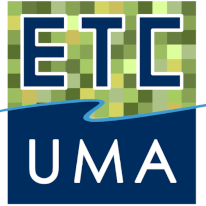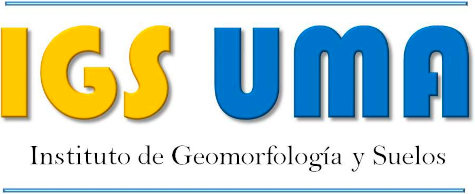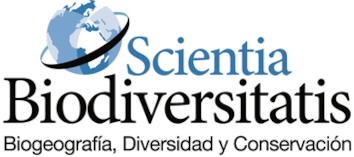
Khaos Research Group
The Khaos Research group of the University of Malaga focuses its research activity on the management, integration, and analysis of data and Big Data. It works at the intersection of technologies related to large-scale data management and integration, W3C data standards, data analytics technologies, optimization with meta-heuristics, and Big Data analysis. It emphasizes the application of research results to real problems, especially in health and agrifood. Within the previous context, the current research proposal focuses on the exploitation of domain semantics in the algorithms and workflows of Big Data analysis.

ETC UMA
The European Topic Centre on Spatial Analysis and Synthesis (ETC-UMA) is an international research centre within the University of Malaga supporting since 2011 the development of knowledge to feed evidence-based policy from local to Pan-European level. The team has a wide expertise in a range of environmental and socio-economic domains. Its major areas of expertise include remote sensing and spatial analysis, land, and ecosystem assessment, ecosystem services, coastal and marine studies, environmental conservation, territorial development, resource efficiency, and soil mapping.

IGSUMA
The Geomorphology and Soils Laboratory, IGS UMA, is a centre attached to the University of Malaga, integrated into the RNM279 (Physical Geography) research group. It offers analytical support to research, as well as analysis, consulting and recommendation services to individuals and organizations. Its main function is to promote practical, affordable and innovative solutions to current problems related to nutrient management, soil quality and their regeneration. The possible fields of action are broad, from fields of all kinds to natural environments, passing through golf courses or urban parks.

CEHIUMA
The Málaga Hydrogeology Group (GHUMA) was set up by the University of Málaga in response to the growing demand for water and to the problems encountered in this respect, in both its quality and its quantity, especially among the Mediterranean countries. Today's society faces a series of important challenges concerning groundwater, which is currently a fundamental source of freshwater for sustaining life on Earth. Urban supply, irrigation, climate change, the management of aquifers, the protection of water quality, and the application of European Community directives on water issues – these are just some of the topics that must be addressed in forthcoming years, and the University of Málaga cannot remain on the sidelines in this field.

Fauna
The Biogeography research group at the University of Málaga dates from 1984. Its main research is the biogeography of vertebrate groups, but they are also interested in invertebrates, plants, and other biological entities. An important part of their work includes methodological issues of interest for the study of biogeography. The team is a leader in analyzing chorotypes and developing and applying species distribution models, the most relevant contribution in this topic being the Favourability Function. Currently, the group is focused on the impacts of global change on biodiversity; updating the Spanish atlas of terrestrial mammals; investigating the management and sustainability of game and marine resources; analyzing the ecological dimension of indigenous peoples; and exploring useful patterns for sanitary prevention, in the biogeography of zoonotic diseases, transmitted by animals.

Flora
Flora's research team at the University of Malaga has extensive experience in fieldwork and the collection and compilation of samples both in the habitats of interest and in herbaria at the universities. His main areas of specialization include studies of plant communities composed of pteridophytes, gymnosperms, and angiosperms. Analysis of the morphological and functional regenerative characteristics of plant species as well as the creation, updating, and management of databases from the Flora research line, the Vegetation, and Habitats line, and the Plant Functional Characteristics line.

SCBI
The Supercomputing and Bioinnovation Center of the University of Malaga provides scientific support and resources to the UMA research groups, public institutions and private companies, especially in the computing, nanotechnology and biological fields. It also provides a one-stop solution to scientists problems, unifying the tools to process samples with the computers and expertise to analyze that data in the same place. This way you can get the solution to your problem without worrying about intermediate steps. They also help with advisory and training services in all the steps of your work. They are located at the Parque Tecnológico de Andalucía, in a hi-tech business environment and hosts the Supercomputing and Bioinformatics facilities, the Omics unit and Nanotechnology labs as well as several spin-offs related to biotechnology.

ERTIS
ERTIS (Embedded Real-Time Systems) focuses its research activity on improving the management, accessibility, and integration of embedded devices in the context of the Internet of Things (IoT). ERTIS also investigates the integration of Edge, Fog, and Cloud paradigms to optimize response times, fault tolerance, and security in the IoT. They also work on using deep and distributed neural networks in this context and on the integration of IoT and Blockchain. The fruit of this research has been successfully applied in the monitoring of Critical Infrastructures and Smart Grids. ERTIS is also part of the ITIS Software institute.

Aerobiology group
The aerobiology group of the University of Malaga is part, since 1992, of the Spanish Aerobiology Network (REA) and the European Aeroallergen Network (EAN). They provide general information about the aeropalinology of the province of Malaga and Costa del Sol, showing the pollen calendars carried out as well as information about the main types of pollen that appear in the atmosphere.